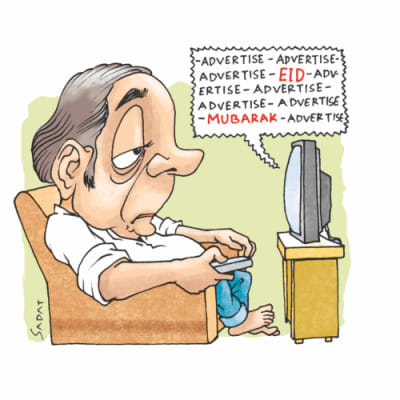A test of patience

There aren't too many occasions in a year when almost the entire nation goes on a three-day vacation at once. The two Eids are, therefore, the time for many to connect with family to lay back and enjoy.
Even a decade ago, TV entertainment was a major element of Eid celebrations, but viewers' complaints of excessive advertisements interrupting the Eid programmes have been escalating in the last few years. But who really is to blame?
TV channel authorities, programme makers and advertisement agencies all agree that viewership of Bangladeshi channels is still at its peak during the Eids.
Noted TV and film director Mostofa Sarwar Farooki said, "Even the households that watch foreign channels throughout the year watch Bangladeshi channels during this time ... It is the best time for both makers and channels to showcase themselves."
He, however, termed the big chunks of advertisements an "annoying experience" and commented that unless TV channels realise and act upon it soon, they would lose viewers.
Veteran actor-director Tariq Anam Khan, also the General Secretary of TV Programme Producers' Association, said Eid programmes on TV can still draw audience because better productions are rolled out on the occasion, but "the long stretch of ads makes it impossible to concentrate on the programmes".
He said an alternative to the situation has to be sought, otherwise the industry would suffer.
Mamunur Rashid, another seasoned actor-director, echoed the thoughts, and added that because of the sheer number of TV dramas, serials and telefilms, it could be difficult for the audience to find the quality ones.
TV channel authorities, meanwhile, are trying to find a workaround.
Mustafa Kamal Syed, head of programmes at the NTV, said: "We're the first channel to introduce break-less and single-break dramas and telefilms, and now other channels are following suit."
The channels are somewhat helpless because advertisements are their sole revenue source, he said.
However, some dramas are getting title or single sponsors, which gives them a scope to show advertisements for brief periods.
"It's a good strategy for advertisers ... because those dramas are viewed more," Mustafa added.
Shamim Shahed, head of programmes at Banglavision, meanwhile said the only source of revenue for Bangladeshi TV channels is advertisements, which is not the case "in any other country".
"Even when Bangladeshi audiences watch Indian channels, the channels get revenue for it."
He admitted that the duration of advertisements has to be reduced and rates must be increased.
"If the satellite channels in Bangladesh can switch to DTH [Direct-to-home] or IP [Internet Protocol] transmission technology, then we can generate revenue directly from viewership, and dependency on advertisements will decrease greatly," he observed.
At the other end, how do the ad-booking agencies think?
Saif Tuhin, associate director of Asiatic Mindshare, said they generally avoid channels that take too many ad spots. Companies that dominate the market also strategise to break the clutter.
"For example, Unilever has bought out the title sponsorships of all the Eid programmes on NTV and Channel i, and thus ensure that their products get the mileage."
He also said while single-branding a programme can help reduce advertisement, "it cannot be overdone because that will wipe out small companies who do not have such a big budget."
While the problem of advertisements is affecting viewers' Eid entertainment on the 'idiot box', the solution is not simple and one-dimensional, and it appears, encouragingly, that all involved parties have accepted it as a problem and are trying their best to find a balance.
With combined efforts, the scenario will get better in coming days; or at least the viewers have to hope that it does.

 For all latest news, follow The Daily Star's Google News channel.
For all latest news, follow The Daily Star's Google News channel. 



Comments